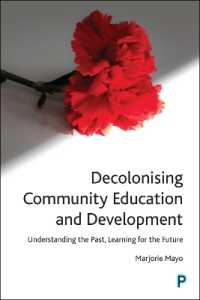- ホーム
- > 洋書
- > 英文書
- > Literature / Classics
Full Description
This is an open access title available under the terms of a CC BY-NC-ND 4.0 International licence. It is free to read at Oxford Scholarship Online and offered as a free PDF download from OUP and selected open access locations.
Epicurus' philosophical project is predicated on its eudaimonistic efficacy. His letters and maxims not only describe a way of life but also instantiate his practice of care and reform. To memorise and understand them is meant to actually advance one's capacity to reach and maintain a state of ataraxia, i.e. the absence of troubles. They are written and designed to have an impact. Thus, to read Epicurus solely as a theoretical philosopher is to turn a blind eye to his agenda. In this book, Solmeng-Jonas Hirschi advocates a stronger reading that takes Epicurus' intentions at face value. It brings the doctrine closer to its application, through an examination of the readers and intended practitioners of Epicurus' philosophy: human beings.
The main corpus of this study consists of the three letters and the doctrines written by Epicurus as transmitted by Diogenes Laertius in book 10 of the Lives of Eminent Philosophers. Each chapter is dedicated to one of these texts and subdivided into two main sections. In the first section, close readings and textual interpretations with a philosophical focus build a heuristic analysis of Epicurus' conception of what human beings are and do. In the second section, lexical analysis and a review of person deixis offer a text-centred counterpart. Together, they delineate the human beings as they are portrayed (theoretically) and addressed (linguistically) in Epicurus' written philosophy.
In the case of the chapters on the Letter to Pythocles and the Kuriai Doxai, additional attention is paid to the problem of their authenticity by focusing on the production, structure, and function of those texts, which prove essential in assessing their form and content. A final appendix applies the same methodology to the Letter to Mother, found in Diogenes of Oenoanda's monumental inscription.
This study yields important insights into the pragmatics of Epicurus' writings, especially with respect to their use, their format, and their functioning in one's efforts to become and remain untroubled. Such results are invaluable for our understanding of why, and how, Epicurus thought that his teaching can be efficacious and therapeutic.
Contents
Introduction
1: Letter to Menoeceus
2: Letter to Herodotus
3: Letter to Pythocles
4: *k)uro*i*a*i *D)o*x*a*i





